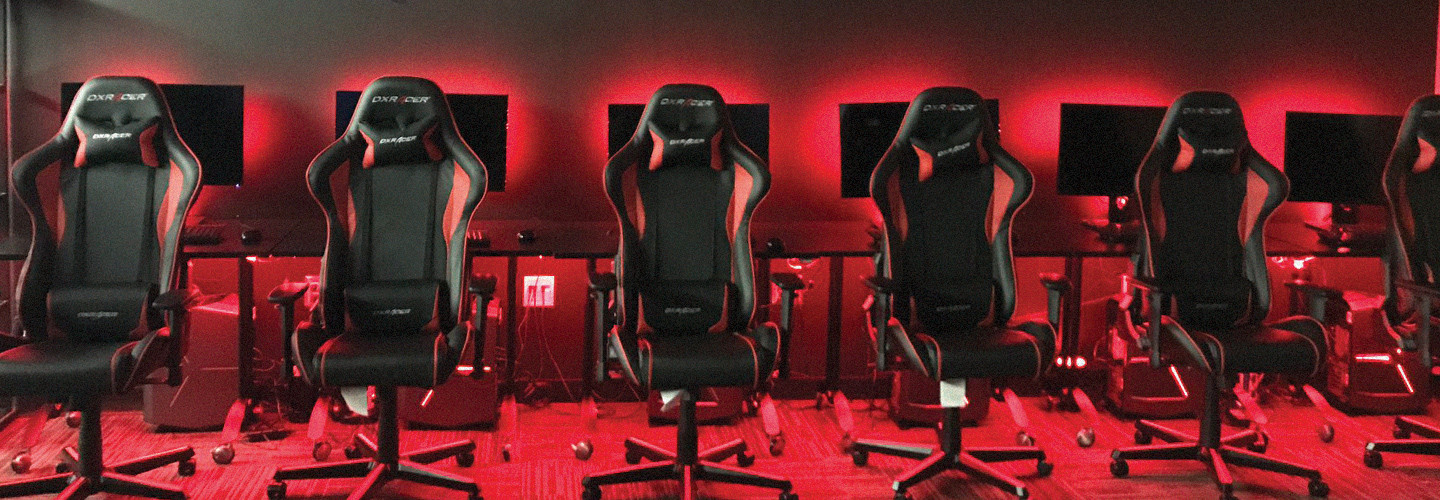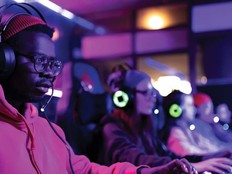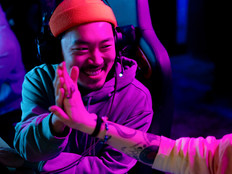Esports Is Here to Stay — No Matter What
At Miami University in Ohio, the school’s 35-member varsity esports team plays on high-end Dell Alienware Aurora R9 machines. If campus closes, the competitive players can use those gaming stations to support remote tournaments. “If the machines are just going to be sitting in a room here, we might as well send them home,” says Glenn Platt, head of the interactive media studies program, which includes esports.
If campus is open, play will shift from the university’s esports arena to a half-dozen classrooms so players can practice social distancing precautions more easily.
On campus, the school’s robust network provides ample bandwidth to support competitive play. It’s unclear how that will evolve if students play from home. “We did fine in the spring. We won tournaments, and my players never said that connectivity was a reason why they didn’t play well,” Platt says. “But this is all so unprecedented. It’s hard to say what is reasonable or unreasonable.”
Others have concerns about connectivity for students competing at home. “You lose a little with internet outages, but there is nothing we can do about that,” Dimick says. “We’ve been in playoff games with club teams who were playing at their parents’ houses, and they lose the connection. It’s not the best way to win, but it is just a reality we have to deal with right now.”
A New Look For Esports Competition Spaces
At Robert Morris University in Pennsylvania, the new reality will likely include a reconfigured competition space, with plexiglass partitions between players who compete on HP Omen gaming PCs. Fans can watch on screens in a room across the hall. “It’s definitely going to look different,” says Armand Buzzelli, who oversees club sports, including esports.
Even if the team can game together in person this fall, esports players will still leverage virtual tools for other aspects of club activity. “We have a thing where we invite high schools to come out and play against our team in things like Rocket League and Hearthstone,” Buzzelli says. “We’ll have to do those virtually now.”
Google Meet and Zoom will support these remote engagements, along with Discord, a gaming-specific chat platform where students and recruits can challenge each other.
Discord has proved to be indispensable for many college esports teams during campus closures. “It’s almost like a virtual rec center for esports,” Buzzelli says. “Right after the university closed in mid-March, we didn’t miss a beat — because of Discord. We actually grew our following, with more people watching our streams. We’d hold a Friday night game of the week, and there would be 200 or 300 people watching.”
While players collaborate on Discord, games are typically broadcast on Twitch, a platform popular among collegiate esports teams. Streaming out live play gave fans something to root for when other sports were on hold. “You don’t broadcast a typical intramural basketball tournament, but we will broadcast intramural esports events, like Madden tournaments, on our Twitch, and that gets people excited,” he says.
The Techs For Winning Esports Tournaments
In Utah, Dimick’s team won a League of Legends tournament during lockdown and finished as semifinalists in the Tespa Overwatch Collegiate Championship.
Play will continue from home in the fall, regardless of whether campus reopens. “Esports will function entirely off campus,” Dimick says. “We are holding remote summer tryouts, and that is how we will continue, with students participating in esports from home at least through the fall.
“It is very imperfect,” he says. “You can’t communicate with body language or line of sight, and there’s a cost to that. You do lose some of that team dynamic.”
Callum Fletcher, director of esports at Illinois Wesleyan University, worries about that too. His gamers compete on customized ByteSpeed machines with HyperX peripherals and custom Respawn chairs. Even if he can make some of that equipment available to at-home players, “doing it virtually still lowers the impact a little bit, because they are not with the team physically and in person,” he says.
“But they will have the same practice schedules as the rest of the team,” he says. “They will compete with the rest of the team. It will feel like they are part of the program.”
For those who can play on campus, renovations to Illinois Wesleyan’s 5,000-square-foot gaming space come at an opportune time. “It will allow us to spread out a little more,” Fletcher says. “We’ll have distance between the players, we’ll have plexiglass between the computer stations and we will limit the number of people who can be there at one time.”
Some things will be different this year. “We won’t have as many live events, we won’t be traveling to as many tournaments and a lot of the competition will transition to an online format,” Fletcher says. Even with these constraints, some see esports as way to keep students engaged in college life during disruptive times.
In an informal internal study, Dimick found 83 percent of all students in the college of engineering use Discord. They’re interested in gaming, he says, even if they aren’t gamers themselves.
With other sports sidelined, “there’s a value proposition for universities to invest in esports right now,” Dimick says. “We have been providing content and brand engagement when there is so little of that available to universities. And we can do it with the students all home and all safe.”










